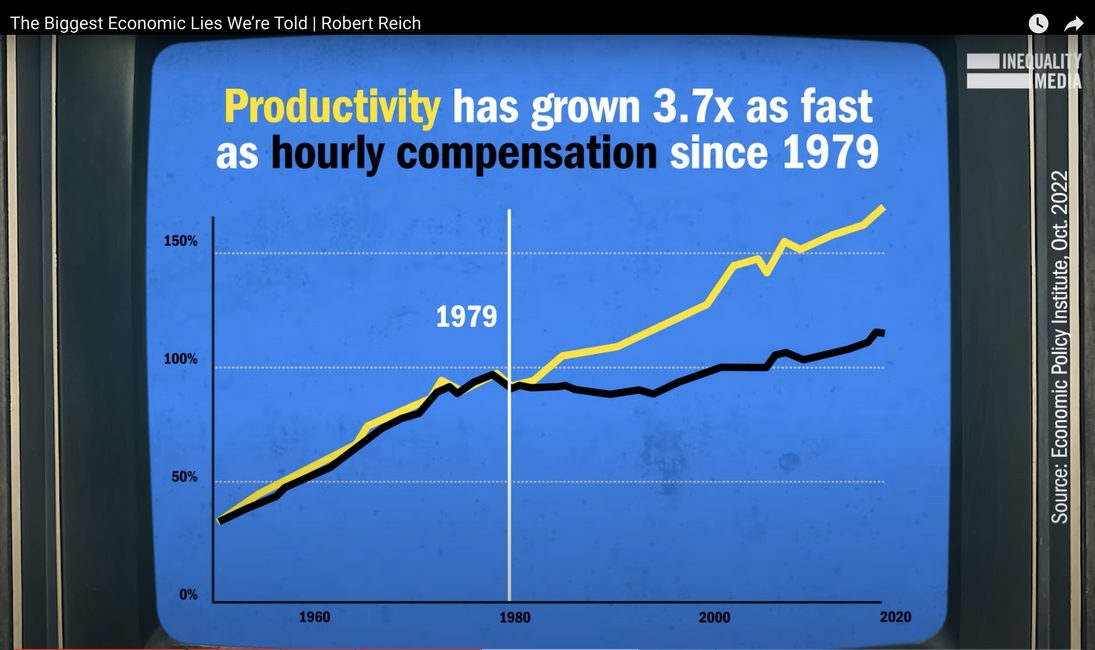 (Source: Robert Reich, The Biggest Economic Lies We’re Told)
(Source: Robert Reich, The Biggest Economic Lies We’re Told)
There’s class warfare, all right, but it’s my class, the rich class, that’s making war, and we’re winning. – Warren Buffett
(Source: Jon Schwarz, The Murder of the U.S. Middle Class Began 40 Years Ago This Week, The Intercept)
A major reason Donald Trump narrowly won the presidency in 2016 was his skill at tapping into the very real and legitimate frustration and anger many Americans feel toward the rich and powerful, who seem to have hogged all the economic gains of the past fifty years for themselves.
Though Trump pointed to scapegoats, he had no actual plan to address or fix ordinary Americans’ very real economic frustrations. In fact, one of Trump’s few legislative accomplishements seriously exacerbated the financial gulf separating the ultra-rich from the rest of us via a massive tax giveaway to the very wealthiest Americans. (See: Justin Elliott and Robert Faturechi, Secret IRS Files Reveal How Much the Ultrawealthy Gained by Shaping Trump’s “Big, Beautiful Tax Cut”, ProPublica.) Trump skillfully exploited people’s helplessness and anger to ride into the White House, despite being one of the very wealthy elites his voters tend to despise, then exploited his voters’ ignorance about the factors causing their misery by handing a financial windfall to America’s wealthiest.
So, what REALLY has caused so many Americans so much misery and what actions would actually help?
American business power has concentrated in the hands of fewer and fewer megacorporations over the past half century. Corporations with monopolistic or oligopolistic power seldom restrain themselves from exploiting that power by raising prices and lowering quality/service, etc… Just think of your local cable or Internet provider or the price of life-saving allergy medicine EpiPen exploding from under $100 to over $600 in under five years (partly thanks to Sen. Joe Manchin’s daughter, Mylan CEO Heather Bresch).
Monopoly power is hardly limited to the corporations with whom consumers interact with directly. Four firms control 85% of all beef production in America and a majority of pork and poultry production (Robert Reich, The Biggest Economic Lies We’re Told).
Here are a few academic research papers documenting the ever-increasing market concentration and ever-rising corporate profits that result:
- Heather Boushey and Helen Knudsen, The Importance of Competition for the American Economy, The White House Council of Economics Advisors (CEA)
- Gustavo Grullon, Yelena Larkin and Roni Michaely, Are US Industries Becoming More Concentrated?, NYU Stern School of Business
- Thomas Philippon, The Economics and Politics of Market Concentration, National Bureau of Economic Research (NBER)
- Leena Rudanko, Is Rising Product Market Concentration a Concerning Sign of Growing Monopoly Power?, Federal Reserve Bank of Philadelphia Research Department
- Kai Wu, Monopolies are distorting the stock market, Sparkline Capital
Government has relentlessly cut regulations intended to protect the public interest. See, as a recent example, how Silicon Valley Bank successfully lobbied DC hard for less regulation (Karl Evers-Hillstrom, Silicon Valley, Signature banks lobbied hard to loosen bank rules), then destroyed itself by taking unwise risks regulators would not have allowed.
This is but the latest chapter in a never-ending circle of government bank deregulation, followed by excessive risk-taking, followed by bank failure, followed by bank re-regulation, which then gets undone after banks “no longer require” regulation. After 1929, the Glass-Steagall Act was passed to protect the public against bank failures. The 1999 Gramm-Leach-Bliley Act partially repealed Glass-Steagall, which helped cause the financial crisis of 2007-8. Following that fiasco, Washington sought to protect consumers and our banking industry (from itself) by passing the 2010 Dodd-Frank Act but rolled back some of those protections in 2018’s Economic Growth, Regulatory Relief, and Consumer Protection [sic] Act, under which “banks with $250 billion or less in assets were not “systemically important” — up from the previous $50 billion threshold — sparing banks from the strictest oversight conducted by the Fed” (Karl Evers-Hillstrom, Silicon Valley, Signature banks lobbied hard to loosen bank rules).
Congress and presidents have also slashed regulatory agency budgets. They’ve staffed regulatory agencies with industry insiders who oppose their agency’s public-interest mission and actively sabotage them. They’ve tolerated merger mania and allowed megacorporations to merge and merge till only a handful of giants remain. Corporations have been able to aggressively suppress labor unionization efforts.
All of this has happened since and because the US politicians have decided they love unlimited campaign contributions from corporations. (Thanks, Citizens United! See: The Brennan Center, Citizens United Explained)
The harm we suffer from corporate-owned politicians is not even limited to legislation. Politicians have stacked our Supreme Court with pro-corporate justices fundamentally inclined to side with corporations over “we the people” Academics report the current Supreme Court is statistically easily the most pro-business court of the past century:
Using a simple objective measure – how often does business win in the Court when it is fighting a non business – we find that the Roberts Court may be the most pro business Court in a century. The win rate for business in the Roberts Court, 63.4%, is 15 percentage points higher than the next highest rate of business wins over the past century (the Rehnquist Court, at 48.3%).
(Source: Lee Epstein & Mitu Gulati, A Century of Business in the Supreme Court, 1920-2020, Minnesota Law Review Headnote)
Because US government has refused to protect consumers, rein in monopolistic mergers, or punish CEOs who engage in price-fixing conspiracies, Americans systematically get ripped off by paying higher prices for lower quality Internet access than people living in most other developed nations. The same is true in US pharmaceuticals and healthcare and across many other industries. In industries the US government has allowed to consolidate and “self-regulate,” Americans pay more for less and have fewer choices. Even worse, taxpayers provide giant corporations with massive tax subsidies.
This usurpation of power from workers, consumers, and small business by ever-larger megacorporations has been steadily intensifying, at least since Ronald Reagan became president, bringing with him to the Oval Office and American culture his love of deregulation and union-busting.
Media industry consolidation is enabling a handful of powerful pro-corporate owners confuse and misinform the US people:
Analyzing over 7 million news segments across over 700 stations, they find that those acquired by Sinclair Broadcast Group saw a 25 percent rise in national news coverage alongside a shift to the ideological right in their coverage.
…[A] measure of ideological “slant” based on the content of news segments shifted to the right at Sinclair-acquired stations following the acquisition, compared to other stations in the same market. Following the acquisition, news programs on Sinclair-owned stations looked more like Fox News and less like MSNBC than they had before.
Viewers’ reaction to these changes was negative: Sinclair-acquired stations experienced a small drop in viewership following the acquisition. The shifts toward a righter leaning slant and more national politics coverage do not appear to have gained these stations additional viewers. (Source: London School of Economics blog, The FCC’s hands-off approach to media consolidation means that local news increasingly looks more like Fox News)
UC Berkeley professor and former US Labor Secretary Robert Reich explains America’s political economy well:
- The Truth About Corporate Subsidies
- The Biggest Economic Lies We’re Told
- How Wealth Inequality Spiraled Out of Control
- The System: Who Rigged It, How We Fix It
- The Little Secret About Corporate Profits
The recent inflation has been driven less by by firms raising prices due to rising input costs and more by firms using rising input costs as cover for exploiting their market power.
Sadly, although the United States government does an especially poor job of protecting customers from predatory large corporations, this is also a global problem, potentially threatening even the global food supply. (See: Jennifer Clapp, The problem with growing corporate concentration and power in the global food system.)
Saddest of all, prospects for improvement are bleak, given how most of Congress and the Supreme Court behave as if they are employees of the major corporations who fund their campaigns, rather than the people they nominally represent and who sent them to Washington, DC. “We the people” will remain crippled in our ability to elect those who will actually represent us so long as the true nature of this long-con is hidden from us by a highly concentrated media owned by the ultra-wealthy who have little interest in educating Americans about how the system works largely for their interests and against ours. As long as we remain angry but ignorant of the ultimate cause of our misery, our ignorance will continue being easily preyed upon by those who point at scapegoats while letting the uber-rich who fund their campaigns win the shell game.
(Appreciation to Robert Linder for sharing his Unsplash photo)
